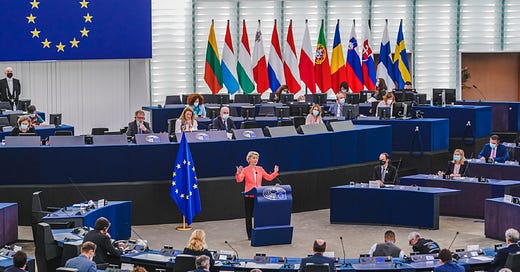Russia demanding Europe pay for gas in rubles could have huge repercussions
Moscow’s demand that the EU pay for gas exports in Russian rubles could shake up the global economy, undermining Western sanctions, forcing Europe to decide if it truly wants independence from the US
By Leo Rowley
(Se puede leer este artículo en español aquí.)
Russia announced on March 23 that going forward it will only accept rubles as payment for natural gas contracts with what it calls “unfriendly countries” – that is to say, nations that have imposed sanctions on Moscow.
This is a very important geopolitical development that could have big repercussions for the global economy.
Russia supplies nearly 40% of the European Union’s natural gas. This is used to heat homes and power the European grid. It is a cheap energy source that keeps costs down for European companies.
Less known is that natural gas is also a vital raw material in manufacturing essentials like fertilizers and pharmaceuticals.
EU sanctions imposed on Russia over its war in Ukraine have conveniently excluded natural gas for this reason.
Despite the Western bravado around further ratcheting up sanctions, there is no feasible way for the EU to sever its own gas supply and avoid triggering complete pandemonium in European markets.
Even were the United States and other countries to swoop in and frantically attempt to make up the shortfall, Europe’s infrastructure for alternative energy sources like liquefied natural gas is not yet built. Developing it could take years.
The EU could proceed to sanction Russian gas anyway, and limp its way through the spring and summer. But by the fall, it could face a cold winter with severe fuel rationing not seen since World War Two.
In short, Europe needs Russian gas for the foreseeable future. But buying that energy in rubles would directly cut against the Western strategy to use economic warfare to devalue the Russian currency.
Given that the EU’s sanctions place it squarely atop Russia’s “unfriendly” list, it is now confronted with procuring rubles to purchase Russian gas. But how?
The European Union has four main options:
Exchange gold for rubles
“Barter” goods for Russian gas
Trade euros for rubles on the foreign exchange (forex) market
Buy rubles from Russia’s central bank with euros or US dollars
And each of these options has consequences:
Gold is basically sanctions proof, and thus not a form of payment the West wants to use. Gold is also an unsustainable means of payment, as it would deplete EU reserves.
It is impossible for Europe to “barter” with Russia without first lifting sanctions, which it doesn’t want to backpedal on.
Trading euros for rubles on the forex market will cause the ruble to rapidly appreciate against the euro – something the US is vehemently fighting against, as it would contradict its strategy to weaken the currency, while making goods cheaper to import into Russia and curbing its inflation.
Buying rubles from Russia’s central bank may not even be an option, as Moscow could refuse to accept euros or US dollars given the ways that holdings in Western currencies could be weaponized against it.
If Russia refuses payment in euros and US dollars, “unfriendly” countries will be forced to first purchase an intermediary currency, like the Chinese yuan.
This prospect of being forced into purchasing yuan is something the West has been anticipating, but has little remaining leverage to prevent.
This is why the United States and NATO have resorted to gunboat diplomacy toward Beijing, threatening to impose sanctions on China for helping Russia skirt the West’s unilateral coercive measures.
This bifurcation of the world into a “with us or against us” showdown is likely setting the stage for renewed sanctions on China.
But with total trade with China nearly triple the value of trade with Russia, EU sanctions on China would cause all prices to skyrocket. And the resulting instability is something Washington hopes to exploit, by boosting US energy exports and keeping Europe reliant on it instead of Moscow.
Recognizing the opportunities for big energy markets in Europe, the Joe Biden administration has issued even more drilling permits on public lands than the Donald Trump administration did – and Trump had broken records.
These actions show how, even more than isolating Russia, the conflict over Ukraine is about cleaving a receding Europe off of Asia and forcing it back into dependency on the United States.
EU leaders now have a fateful decision to make: if they continue down the path of subordinating to US aggression against Russia, Europe will be plunged into economic chaos.
But if European leaders instead break from their post-WW2 role as US vassals, they have a chance at a soft landing, marked by peaceful and productive relationships with Russia and China.
So far, most EU states seem to be steering decisively toward the former. But there are cracks that are forming in the bloc, as each country does its own political and economic calculus.
And given that even close US ally Saudi Arabia is now considering selling its oil to China in yuan, it is clear that there are major changes taking place in the global economic order.
Zooming out further, this conflict is being spurred on in large part by a falling rate of profit in the West, a tendency that is ever present in the capitalist system.
This tendency for the rate of profit to decline can be staved off, as it was during the last four decades of neoliberalism, but only temporarily.
Neoliberalism is now being upended by waves of national assertions of sovereignty over economies and resources in countries that were once confined to a permanent periphery.
With fewer and fewer nations left to super-exploit, the conflict ostensibly over Ukraine could represent the beginning of a process in which the core eats itself, as its own tools of imperialist exploitation are turned inward.
And a spark for this dramatic global shift could be a seemingly simple switch to rubles.




